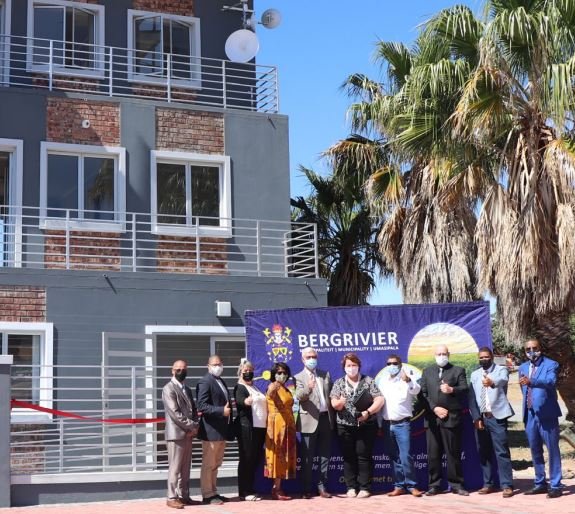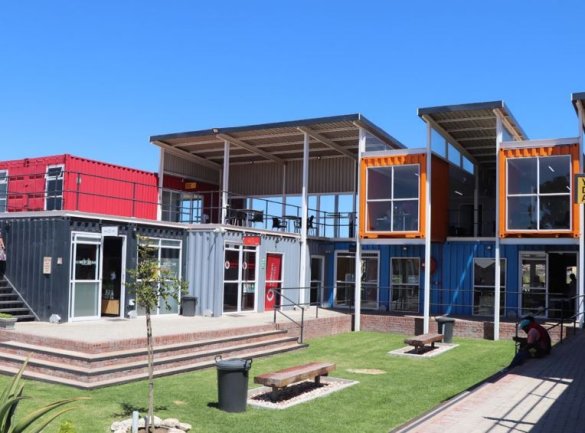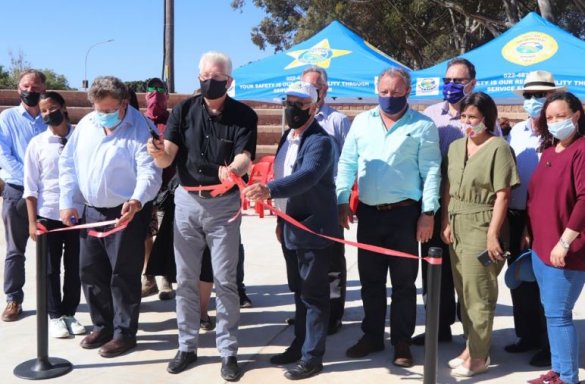The Premier of the Western Cape Alan Winde, the MEC of Local Government, Environmental Affairs and Development Planning (DEA&DP), Anton Bredell, and the HOD of DEA&DP, Piet van Zyl visited a range of projects that fall under the Regional Socio-Economic Programme (RSEP) on 19 October, which included the towns of Piketberg, Velddrif, Vredenburg and Darling.
The RSEP Programme, currently in its 7th year of implementation, is a transversal and inter-governmental priority strategic initiative by the Western Cape Government. The Programme aims to support (financially and technically) projects that bring about spatial upliftment and restructuring through safer public spaces, local economic development initiatives and recreational facilities in under-served areas. In so doing, the Programme brings together a range of stakeholders, both local, provincial, national and private, to achieve effective and efficient joint planning and implementation, and thereby adopting a ‘whole-of-government’ approach. While projects are identified and managed by different role players, RSEP plays a key role facilitating the overall process and assisting with the planning.
Premier Winde said: “The RSEP has, since its inception in 2013, invested over R230 million in poor communities in the Western Cape. Almost half of these funds were co-funded by participating municipalities. The programme focuses specifically on the areas outside the metropolitan area of Cape Town. I want to commend each and every stakeholder from the local municipalities to the Western Cape Government for the collaboration and partnerships which have made these various programmes possible.”
Minister Anton Bredell added: “We continue to make huge strides in reducing apartheid spatial inequality through the department’s innovative Regional Socio-Economic Programme, a programme aimed at improving the quality of life of residents in poorer and often more rural communities.”
Bergrivier Municipality
Three towns in the Bergrivier Municipality were selected to form part of the RSEP Programme, namely Piketberg, Porterville and Velddrif. The RSEP Programme allocated a total of R7.5m in grant funding to the Bergrivier Municipality, while the municipality co-funded an additional R2.1m for projects. All of the projects have been completed (except for the completion of the lighting of the Velddrif project).
Piketberg:
Active box: This is a three-storey multifunctional community building located along a major pedestrian route and a landmark in the neighbourhood. The purpose of the Active Box is to make the community safer and to contribute to the quality of life of residents. The Bergrivier Directorate Disaster Management occupies the first floor, and the second floor is used as a control room of the Municipal Law Enforcement unit.
The extension of Calendula Street has reduced the daily travel distance to the CBD for marginalised neighbourhoods. More importantly, it created a direct and safe link between the segregated neighbourhoods and
the central business district and more affluent areas. Previously there were dilapidated buildings and walls dividing the communities.
Another project includes the construction of an outdoor gym.
Porterville:
A walkway from Monte Bertha to Porterville CBD was constructed with ablution facilities and trading stalls.
Velddrif:
The project involves the upgrade of the existing pedestrian walkway between Laaiplek and Noordhoek, with a paved surface that is wide
enough for pedestrians and cyclists. This connects the lower income neighbourhood of Noordhoek with shops and facilities in Laaiplek. The existing lighting will also be upgraded to make it safer.
Saldanha Municipality
The Saldanha Municipality formed part of the first phase of the RSEP Programme where Vredenburg (Phase 1) was identified as the main area for implementation. After the success of the 1st Phase, Saldanha town (Phase 2a) was selected to also form part of the RSEP Programme.
The RSEP Programme allocated a total of R22m in grant funding to Saldanha Municipality, while the municipality and other funders (such as mining companies) co-funded an additional R33m for projects. Three of the projects are still under way to be completed early 2022.
Vredenburg:
The Westbank Gateway Precinct consists of local economic development units, an active box, trading spaces, paving, landscaping, seating and lighting, as well as the recently constructed Live Work Units. The next phase
will be a lit pedestrian walkway, that connects the West Collage and Municipal Library with the Kooitjieskloof Corridor.
- Restoration of the old Vredenburg Station Building.
- Urban Splash Park: located in the underserved Louwville area. The Splash Park uses recycled borehole water and is used as a safe recreation space for the youth during summer. The park also consists of an active box with a local business and neighbourhood watch on the 3rd floor.
- Ongegund Hub and the Witteklip Container Box Park: Currently being finalised are the Ongegund Trading Units in the George Kerridge Business Node, which consists of an active box, LED units, and planned trading units.
Saldanha:
- Middelpos Box Park: This is a refurbished shipping container project, which consists of eight units provided in an exciting design for local businesses in the Middelpos informal settlement in the town of Saldanha.
- Cottager Recreational Park: This recreation space will consist of a 5-a-side AstroTurf soccer field, mini-cricket pitch, and seating for the local community of Diazville, Saldanha.
Swartland Municipality
The Swartland Municipality also formed part of the first phase of the RSEP Programme, where Malmesbury was identified as the main area for implementation. Between 2014 and 2020, many large-scale infrastructure projects were completed in Malmesbury such as an indoor sports centre, two recreation nodes, tree planting, safe lighting, informal trading area and a road underpass with safe walkways, connecting the residential areas west of the N7 with the industrial area and CBD on the eastern side of the N7.
Darling:
After the success of the projects in Malmesbury, Darling was selected to also form part of the RSEP Programme.
Intercultural Space Project: The 1st Phase of the project includes the amphitheatre, ablution facilities, dressing rooms, an outdoor gym and play area, and landscaping which was completed in 2021. The remaining phase of the project still needs to be completed and is dependent on available funding. The visits to the three towns, together with the opening ceremonies were a great success, with all involved being rejuvenated by positive feedback. This was merely a glimpse of the projects, as it was not possible to fit all into one day. Apart from the above projects, nine other municipalities in the province are benefitting from the RSEP programme.
The visits to the three towns together with the opening ceremonies organised by the three municipalities went very well and all involved were rejuvenated by the positive feedback received. There were, unfortunately, also an instance of vandalism observed by the delegation. That said, RSEP should be a vehicle to better understand the “lived experiences” of ordinary citizens and what facilities work well on the long-term in terms of being well-utilised by the communities but also in terms of maintenance and robustness.
Francois Wüst, Programme Manager for the RSEP Programme said: “It is a privilege being involved in this programme and we are also immensely grateful to our HOD for his vision and ongoing support. The unwavering support from Minister Bredell should also be highlighted.
We are excited by the enthusiasm and true understanding expressed by the Premier during the site visit and that he initially approved the funding of the RSEP programme in 2012, when he was the Minister of Finance. Therefore, we are looking forward to a great and prosperous future for the programme”.



